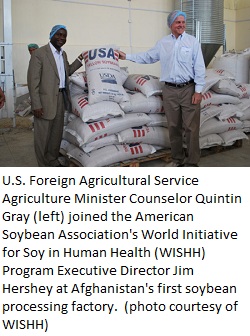 We hear a lot about the war in Afghanistan but often times don’t hear as much about the peace-building efforts there. From my own experience, I can tell you that our efforts to build that nation will most likely have as big, if not bigger, impact as any military strike. Our friends at the American Soybean Association (ASA) must be thinking the same as they have partnered with the USDA’s Foreign Agricultural Service for the World Initiative for Soy in Human Health (WISHH) Program to put in Afghanistan’s first soybean processing factory as part of the Soybeans in Agricultural Renewal of Afghanistan Initiative (SARAI).
We hear a lot about the war in Afghanistan but often times don’t hear as much about the peace-building efforts there. From my own experience, I can tell you that our efforts to build that nation will most likely have as big, if not bigger, impact as any military strike. Our friends at the American Soybean Association (ASA) must be thinking the same as they have partnered with the USDA’s Foreign Agricultural Service for the World Initiative for Soy in Human Health (WISHH) Program to put in Afghanistan’s first soybean processing factory as part of the Soybeans in Agricultural Renewal of Afghanistan Initiative (SARAI).
“It’s great to see the Afghan and U.S. partners get this soybean processing facility up and operating,” [FAS Agriculture Minister Counselor Quintin] Gray says. “It will help Afghanistan agriculture continue to develop.”
Through USDA’s Food for Progress Program, WISHH and its partners have established Afghanistan’s first commercial soybean value chain as part of the Soybeans in Agricultural Renewal of Afghanistan Initiative (SARAI). As a result, Iowa-made processing equipment from Insta-Pro now has soybeans from Afghanistan as well as Ohio, Michigan and other states flowing through it. An Afghan company provided the land and the building as well as employs the staff.
High-protein soy flour, soy meal and crude soybean oil is produced at the Mazar-e-Sharif manufacturing facility in northern Afghanistan. A local dairy made the first purchase of 10 metric tons of soybean meal for its herd of 140 Holstein cows, and the cows soon started producing two to three additional liters of milk a day that was a higher quality worth more to customers.
During the three-year project, the Afghan production of soybeans will be augmented with more than 200,000 bushels of U.S. soybeans. Last year, the SARAI project saw 891 Afghan farmers, including 91 women, produce the country’s first commercial crop of soybeans on a total of approximately 450 acres. This year, 3,325 Afghan farmers, including 300 women, are planting soybeans through SARAI.

